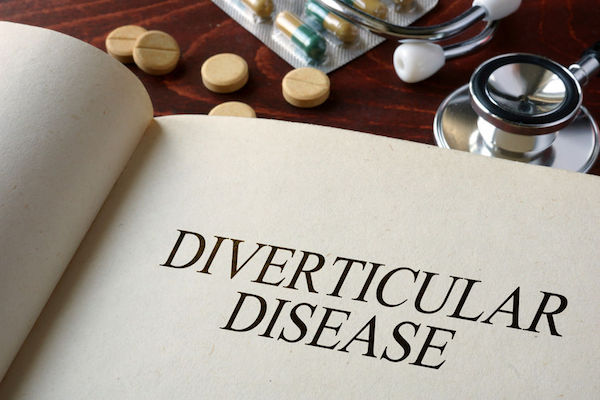Diverticular disease is a condition affecting the large bowel. It occurs when small pouches, called diverticula, push through the wall of the bowel. If they become inflamed and/or infected, diverticulitis occurs.

Although exact causes are not clear, lifestyle and diet may play a part in diverticular disease. The disease is reportedly less common in vegetarians and in people who include more fibre in their diets.
Your risk of developing diverticular disease increases as you get older. It’s thought that half of all people have diverticula by the age of 50, and this may increase to seven in 10 people among the elderly.
Other risk factors include:
- Caffeine
- Some medication
- Red meat
- Alcohol
- Excess weight
- Lack of exercise
The complications of diverticular disease include:
- Abscess formation
- Strictures/obstruction of the bowel
- Fistula (abnormal connection between various bowel segments, or between bowel and bladder, or between bowel and urogenital organs)
- Peritonitis (a potentially fatal inflammation of the abdomen’s lining)
- Bleeding
What are its symptoms?
Symptoms may include:
- Lower abdominal pain
- Diarrhoea
- Bleeding from your rectum
- Bloating
- Constipation
Diverticulitis symptoms are typically more severe. They include:
- Back pain
- Frequent need to urinate
- High temperature
- Vomiting
- Poor appetite
How is it diagnosed?
A diagnosis will typically involve your GP asking about your symptoms, as well as a physical examination. He or she will also ask you about your medical history, diet and bowel movements.
Diverticular disease can be difficult to diagnose because your symptoms may also be similar to other conditions, such as irritable bowel syndrome (IBS).
For confirmation, you may need to undergo one of the following tests:
- Blood test: To look for signs of infection.
- Colonoscopy: It allows your doctor to look inside your large bowel. This test can confirm if you have it and rule out other conditions such as bowel cancer.
- A CT (computerised tomography) scan: Uses X-rays to make a 3D image of your body or a part of your body. It can show if you have diverticulitis and any complications linked to it.
- Barium tests: It involves passing barium-containing liquid (a substance that shows up on X-rays) into the colon through the rectum.
What are your treatment options?
Treatment for diverticular disease and diverticulitis depend on the severity of symptoms. Options include a change of diet, medication and surgery:
- A diet plan with increased soluble fibre is recommended. This usually results in an improvement in bowel habits.
- Your doctor may advise the short-term use of laxatives to treat constipation.
- When symptoms are severe and disabling, surgery is performed to remove affected bowel segments.
Can it be prevented?
There are several remedies you can follow for good digestive health, which may prevent diverticula from forming:
- Avoid too much red meat
- Exercise regularly
- Eat fatty food in moderation (as these can lead to intestinal blockage)
- Quit smoking
- Drink plenty of fluids
- Don’t ignore bowel urges
- Lose excess weight
- Some anti-inflammatories have been linked to increased instances of diverticular bleeding. Consult with your doctor before taking these.
IMAGE CREDIT: 123rf.com
